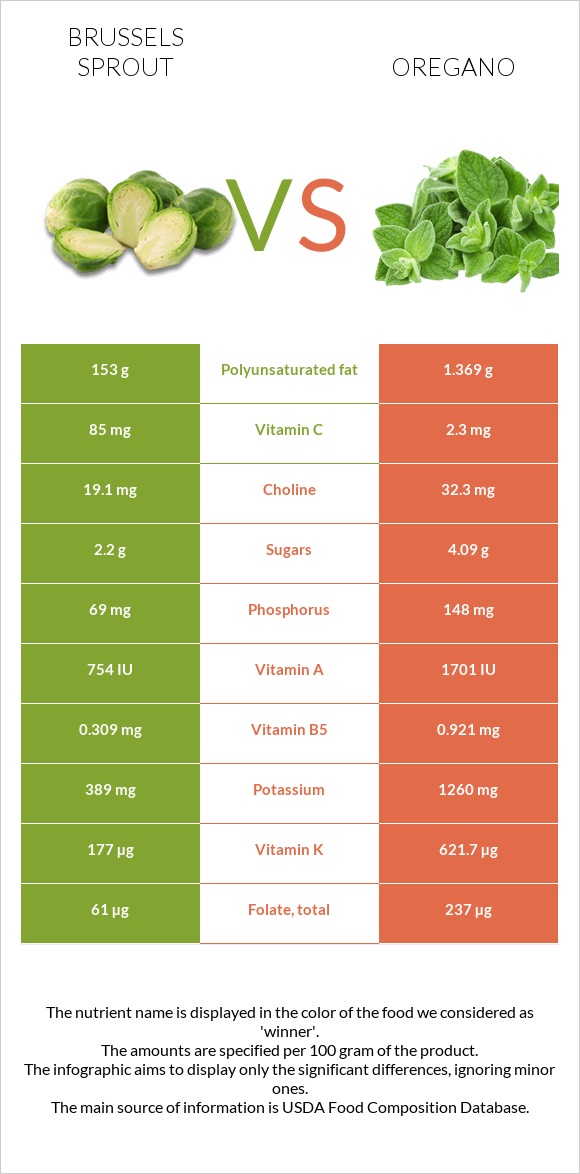Brussels sprouts vs. Oregano — In-Depth Nutrition Comparison
Compare
A recap on the differences between Brussels sprouts and oregano
- Brussels sprouts are higher in vitamin C, yet oregano is higher in iron, vitamin K, manganese, calcium, fiber, vitamin E, vitamin B6, copper, and magnesium.
- Oregano covers your daily iron needs 443% more than Brussels sprouts.
- Brussels sprouts contain 37 times more vitamin C than oregano. While Brussels sprouts contain 85mg of vitamin C, oregano contains only 2.3mg.
Food varieties used in this article are Brussels sprouts, raw and Spices, oregano, dried.
Infographic

Infographic link
Mineral Comparison
Mineral comparison score is based on the number of minerals by which one or the other food is richer. The "coverage" charts below show how much of the daily needs can be covered by 300 grams of the food.
| Contains more MagnesiumMagnesium | +1073.9% |
| Contains more CalciumCalcium | +3702.4% |
| Contains more PotassiumPotassium | +223.9% |
| Contains more IronIron | +2528.6% |
| Contains more CopperCopper | +804.3% |
| Contains more ZincZinc | +540.5% |
| Contains more PhosphorusPhosphorus | +114.5% |
| Contains more ManganeseManganese | +1380.7% |
| Contains more SeleniumSelenium | +181.3% |
Vitamin Comparison
Vitamin comparison score is based on the number of vitamins by which one or the other food is richer. The "coverage" charts below show how much of the daily needs can be covered by 300 grams of the food.
| Contains more Vitamin CVitamin C | +3595.7% |
| Contains more Vitamin AVitamin A | +123.7% |
| Contains more Vitamin EVitamin E | +1975% |
| Contains more Vitamin B1Vitamin B1 | +27.3% |
| Contains more Vitamin B2Vitamin B2 | +486.7% |
| Contains more Vitamin B3Vitamin B3 | +522.8% |
| Contains more Vitamin B5Vitamin B5 | +198.1% |
| Contains more Vitamin B6Vitamin B6 | +376.7% |
| Contains more Vitamin KVitamin K | +251.2% |
| Contains more FolateFolate | +288.5% |
All nutrients comparison - raw data values
| Nutrient |  |
 |
DV% diff. |
| Polyunsaturated fat | 153g | 1.369g | 1011% |
| Iron | 1.4mg | 36.8mg | 443% |
| Vitamin K | 177µg | 621.7µg | 371% |
| Manganese | 0.337mg | 4.99mg | 202% |
| Calcium | 42mg | 1597mg | 156% |
| Fiber | 3.8g | 42.5g | 155% |
| Vitamin E | 0.88mg | 18.26mg | 116% |
| Vitamin C | 85mg | 2.3mg | 92% |
| Copper | 0.07mg | 0.633mg | 63% |
| Vitamin B6 | 0.219mg | 1.044mg | 63% |
| Magnesium | 23mg | 270mg | 59% |
| Folate | 61µg | 237µg | 44% |
| Vitamin B2 | 0.09mg | 0.528mg | 34% |
| Potassium | 389mg | 1260mg | 26% |
| Vitamin B3 | 0.745mg | 4.64mg | 24% |
| Zinc | 0.42mg | 2.69mg | 21% |
| Carbs | 8.95g | 68.92g | 20% |
| Vitamin B5 | 0.309mg | 0.921mg | 12% |
| Calories | 43kcal | 265kcal | 11% |
| Protein | 3.38g | 9g | 11% |
| Phosphorus | 69mg | 148mg | 11% |
| Saturated fat | 0.062g | 1.551g | 7% |
| Fats | 0.3g | 4.28g | 6% |
| Vitamin A | 38µg | 85µg | 5% |
| Selenium | 1.6µg | 4.5µg | 5% |
| Vitamin B1 | 0.139mg | 0.177mg | 3% |
| Choline | 19.1mg | 32.3mg | 2% |
| Monounsaturated fat | 0.023g | 0.716g | 2% |
| Net carbs | 5.15g | 26.42g | N/A |
| Sugar | 2.2g | 4.09g | N/A |
| Sodium | 25mg | 25mg | 0% |
| Tryptophan | 0.037mg | 0.203mg | 0% |
| Threonine | 0.12mg | 0.322mg | 0% |
| Isoleucine | 0.132mg | 0.441mg | 0% |
| Leucine | 0.152mg | 0.78mg | 0% |
| Lysine | 0.154mg | 0.5mg | 0% |
| Methionine | 0.032mg | 0.127mg | 0% |
| Phenylalanine | 0.098mg | 0.449mg | 0% |
| Valine | 0.155mg | 0.585mg | 0% |
| Histidine | 0.076mg | 0.144mg | 0% |
| Fructose | 0.93g | 1.13g | 0% |
| Omega-3 - ALA | 0.621g | N/A |
Macronutrient Comparison
Macronutrient breakdown side-by-side comparison
Protein:
3.38 g
Fats:
0.3 g
Carbs:
8.95 g
Water:
86 g
Other:
1.37 g
Protein:
9 g
Fats:
4.28 g
Carbs:
68.92 g
Water:
9.93 g
Other:
7.87 g
| Contains more WaterWater | +766.1% |
| Contains more ProteinProtein | +166.3% |
| Contains more FatsFats | +1326.7% |
| Contains more CarbsCarbs | +670.1% |
| Contains more OtherOther | +474.5% |
Fat Type Comparison
Fat type breakdown side-by-side comparison
Saturated fat:
Sat. Fat
0.062 g
Monounsaturated fat:
Mono. Fat
0.023 g
Polyunsaturated fat:
Poly. Fat
153 g
Saturated fat:
Sat. Fat
1.551 g
Monounsaturated fat:
Mono. Fat
0.716 g
Polyunsaturated fat:
Poly. Fat
1.369 g
| Contains less Sat. FatSaturated fat | -96% |
| Contains more Poly. FatPolyunsaturated fat | +11076% |
| Contains more Mono. FatMonounsaturated fat | +3013% |
Carbohydrate type comparison
Carbohydrate type breakdown side-by-side comparison
Starch:
0 g
Sucrose:
0.46 g
Glucose:
0.81 g
Fructose:
0.93 g
Lactose:
0 g
Maltose:
0 g
Galactose:
0 g
Starch:
0 g
Sucrose:
0.91 g
Glucose:
1.9 g
Fructose:
1.13 g
Lactose:
0 g
Maltose:
0 g
Galactose:
0.15 g
| Contains more SucroseSucrose | +97.8% |
| Contains more GlucoseGlucose | +134.6% |
| Contains more FructoseFructose | +21.5% |
| Contains more GalactoseGalactose | +∞% |
~equal in
Starch
~0g
~equal in
Lactose
~0g
~equal in
Maltose
~0g





